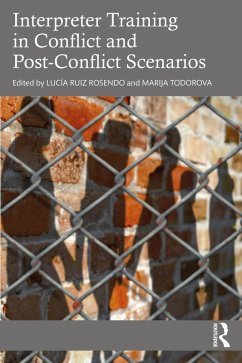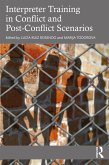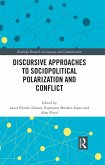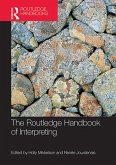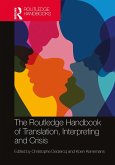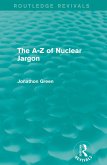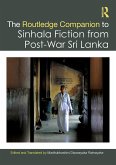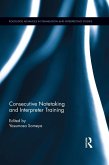Interpreter Training in Conflict and Post-Conflict Scenarios (eBook, ePUB)
Redaktion: Ruiz Rosendo, Lucía; Todorova, Marija
43,95 €
43,95 €
inkl. MwSt.
Sofort per Download lieferbar

22 °P sammeln
43,95 €
Als Download kaufen

43,95 €
inkl. MwSt.
Sofort per Download lieferbar

22 °P sammeln
Jetzt verschenken
Alle Infos zum eBook verschenken
43,95 €
inkl. MwSt.
Sofort per Download lieferbar
Alle Infos zum eBook verschenken

22 °P sammeln
Interpreter Training in Conflict and Post-Conflict Scenarios (eBook, ePUB)
Redaktion: Ruiz Rosendo, Lucía; Todorova, Marija
- Format: ePub
- Merkliste
- Auf die Merkliste
- Bewerten Bewerten
- Teilen
- Produkt teilen
- Produkterinnerung
- Produkterinnerung

Bitte loggen Sie sich zunächst in Ihr Kundenkonto ein oder registrieren Sie sich bei
bücher.de, um das eBook-Abo tolino select nutzen zu können.
Hier können Sie sich einloggen
Hier können Sie sich einloggen
Sie sind bereits eingeloggt. Klicken Sie auf 2. tolino select Abo, um fortzufahren.

Bitte loggen Sie sich zunächst in Ihr Kundenkonto ein oder registrieren Sie sich bei bücher.de, um das eBook-Abo tolino select nutzen zu können.
This volume is structured around interpreter training in different contexts of conflict and post-conflict, from military operations and international tribunals to asylum-seeking and refugees, humanitarian and human rights missions.
- Geräte: eReader
- ohne Kopierschutz
- eBook Hilfe
- Größe: 1.5MB
Andere Kunden interessierten sich auch für
![Interpreter Training in Conflict and Post-Conflict Scenarios (eBook, PDF) Interpreter Training in Conflict and Post-Conflict Scenarios (eBook, PDF)]() Interpreter Training in Conflict and Post-Conflict Scenarios (eBook, PDF)43,95 €
Interpreter Training in Conflict and Post-Conflict Scenarios (eBook, PDF)43,95 €![Discursive Approaches to Sociopolitical Polarization and Conflict (eBook, ePUB) Discursive Approaches to Sociopolitical Polarization and Conflict (eBook, ePUB)]() Discursive Approaches to Sociopolitical Polarization and Conflict (eBook, ePUB)41,95 €
Discursive Approaches to Sociopolitical Polarization and Conflict (eBook, ePUB)41,95 €![The Routledge Handbook of Interpreting (eBook, ePUB) The Routledge Handbook of Interpreting (eBook, ePUB)]() The Routledge Handbook of Interpreting (eBook, ePUB)51,95 €
The Routledge Handbook of Interpreting (eBook, ePUB)51,95 €![The Routledge Handbook of Translation, Interpreting and Crisis (eBook, ePUB) The Routledge Handbook of Translation, Interpreting and Crisis (eBook, ePUB)]() The Routledge Handbook of Translation, Interpreting and Crisis (eBook, ePUB)45,95 €
The Routledge Handbook of Translation, Interpreting and Crisis (eBook, ePUB)45,95 €![The - Z of Nuclear Jargon (Routledge Revivals) (eBook, ePUB) The - Z of Nuclear Jargon (Routledge Revivals) (eBook, ePUB)]() Jonathon GreenThe - Z of Nuclear Jargon (Routledge Revivals) (eBook, ePUB)26,95 €
Jonathon GreenThe - Z of Nuclear Jargon (Routledge Revivals) (eBook, ePUB)26,95 €![The Routledge Companion to Sinhala Fiction from Post-War Sri Lanka (eBook, ePUB) The Routledge Companion to Sinhala Fiction from Post-War Sri Lanka (eBook, ePUB)]() The Routledge Companion to Sinhala Fiction from Post-War Sri Lanka (eBook, ePUB)45,95 €
The Routledge Companion to Sinhala Fiction from Post-War Sri Lanka (eBook, ePUB)45,95 €![Consecutive Notetaking and Interpreter Training (eBook, ePUB) Consecutive Notetaking and Interpreter Training (eBook, ePUB)]() Consecutive Notetaking and Interpreter Training (eBook, ePUB)43,95 €
Consecutive Notetaking and Interpreter Training (eBook, ePUB)43,95 €-
-
-
This volume is structured around interpreter training in different contexts of conflict and post-conflict, from military operations and international tribunals to asylum-seeking and refugees, humanitarian and human rights missions.
Dieser Download kann aus rechtlichen Gründen nur mit Rechnungsadresse in A, B, BG, CY, CZ, D, DK, EW, E, FIN, F, GR, HR, H, IRL, I, LT, L, LR, M, NL, PL, P, R, S, SLO, SK ausgeliefert werden.
Produktdetails
- Produktdetails
- Verlag: Taylor & Francis eBooks
- Seitenzahl: 238
- Erscheinungstermin: 29. November 2022
- Englisch
- ISBN-13: 9781000790351
- Artikelnr.: 66023275
- Verlag: Taylor & Francis eBooks
- Seitenzahl: 238
- Erscheinungstermin: 29. November 2022
- Englisch
- ISBN-13: 9781000790351
- Artikelnr.: 66023275
- Herstellerkennzeichnung Die Herstellerinformationen sind derzeit nicht verfügbar.
Lucía Ruiz Rosendo is an associate professor at the University of Geneva's Interpreting Department. She has co-edited Interpreting Conflict (Palgrave 2021). Her research has appeared in Linguistica Antverpiensia, Target, War & Society and Armed Forces & Society, among others. She is the coordinator of the project AXS. Marija Todorova is a research assistant professor at the Department of Translation, Interpreting, and Intercultural Studies at Hong Kong Baptist University. She has authored Translation of Violence in Children's Literature (Routledge 2022) and co-edited Interpreting Conflict (Palgrave 2021). She is editor of New Voices in Translation Studies.
List of Contributors
1. Introduction
Lucía Ruiz Rosendo and Marija Todorova
Part I. Training interpreters for the military
2. Ethics in military interpreter training
Pekka Snellman
3. Military interpreter training for context-specific situations
Magnus Dahnberg
4. Training interpreters servicing China's Peacekeeping Forces
Zerong Wei and Luo Tian
Part II. Training interpreters in the context of international
organisations and tribunals
5. Developing interpreter competence: Training interpreters servicing UN
field missions
Alma Barghout and Lucía Ruiz Rosendo
6. Resourcefulness when resources are lacking: A case study of field
interpreters at the Office of the Prosecutor at the International Criminal
Court
Nada Melhem, Nathalie Collart and Dimitri Elman
7. Main challenges of interpreting in the context of the international
protection determination procedures
Michele Arcella
Part III. Training interpreters to work with refugees in national and
regional contexts
8. Training needs of interpreters in the refugee crisis in Africa
Ebenezer Tedjouong and Marija Todorova
9. Interpreting for vulnerable populations: Training and education of
interpreters working with refugee children in the United States
Indira Sultani¿
10. Interpreter training in an asylum context
Sonja Pöllabauer
11. Ethics and training of interpreters in the asylum context
Fabrizio Gallai
12. Technology affordances in training interpreters for asylum seekers and
refugees
Mariachiara Russo and Nicoletta Spinolo
Part IV. Crosscutting implications of interpreter training in conflict and
post-conflict scenarios
13. Interpreting trauma: Service providers' and interpreters' perspectives
Simo K. Määttä
14. The psychological implications of interpreting in conflict zones,
elements for potential mental-health and self-care training for
interpreters
Eleonora Bernardi
15. Enhancing short term memory for conflict zone interpreters
Anjad A. Mahasneh
1. Introduction
Lucía Ruiz Rosendo and Marija Todorova
Part I. Training interpreters for the military
2. Ethics in military interpreter training
Pekka Snellman
3. Military interpreter training for context-specific situations
Magnus Dahnberg
4. Training interpreters servicing China's Peacekeeping Forces
Zerong Wei and Luo Tian
Part II. Training interpreters in the context of international
organisations and tribunals
5. Developing interpreter competence: Training interpreters servicing UN
field missions
Alma Barghout and Lucía Ruiz Rosendo
6. Resourcefulness when resources are lacking: A case study of field
interpreters at the Office of the Prosecutor at the International Criminal
Court
Nada Melhem, Nathalie Collart and Dimitri Elman
7. Main challenges of interpreting in the context of the international
protection determination procedures
Michele Arcella
Part III. Training interpreters to work with refugees in national and
regional contexts
8. Training needs of interpreters in the refugee crisis in Africa
Ebenezer Tedjouong and Marija Todorova
9. Interpreting for vulnerable populations: Training and education of
interpreters working with refugee children in the United States
Indira Sultani¿
10. Interpreter training in an asylum context
Sonja Pöllabauer
11. Ethics and training of interpreters in the asylum context
Fabrizio Gallai
12. Technology affordances in training interpreters for asylum seekers and
refugees
Mariachiara Russo and Nicoletta Spinolo
Part IV. Crosscutting implications of interpreter training in conflict and
post-conflict scenarios
13. Interpreting trauma: Service providers' and interpreters' perspectives
Simo K. Määttä
14. The psychological implications of interpreting in conflict zones,
elements for potential mental-health and self-care training for
interpreters
Eleonora Bernardi
15. Enhancing short term memory for conflict zone interpreters
Anjad A. Mahasneh
List of Contributors
1. Introduction
Lucía Ruiz Rosendo and Marija Todorova
Part I. Training interpreters for the military
2. Ethics in military interpreter training
Pekka Snellman
3. Military interpreter training for context-specific situations
Magnus Dahnberg
4. Training interpreters servicing China's Peacekeeping Forces
Zerong Wei and Luo Tian
Part II. Training interpreters in the context of international
organisations and tribunals
5. Developing interpreter competence: Training interpreters servicing UN
field missions
Alma Barghout and Lucía Ruiz Rosendo
6. Resourcefulness when resources are lacking: A case study of field
interpreters at the Office of the Prosecutor at the International Criminal
Court
Nada Melhem, Nathalie Collart and Dimitri Elman
7. Main challenges of interpreting in the context of the international
protection determination procedures
Michele Arcella
Part III. Training interpreters to work with refugees in national and
regional contexts
8. Training needs of interpreters in the refugee crisis in Africa
Ebenezer Tedjouong and Marija Todorova
9. Interpreting for vulnerable populations: Training and education of
interpreters working with refugee children in the United States
Indira Sultani¿
10. Interpreter training in an asylum context
Sonja Pöllabauer
11. Ethics and training of interpreters in the asylum context
Fabrizio Gallai
12. Technology affordances in training interpreters for asylum seekers and
refugees
Mariachiara Russo and Nicoletta Spinolo
Part IV. Crosscutting implications of interpreter training in conflict and
post-conflict scenarios
13. Interpreting trauma: Service providers' and interpreters' perspectives
Simo K. Määttä
14. The psychological implications of interpreting in conflict zones,
elements for potential mental-health and self-care training for
interpreters
Eleonora Bernardi
15. Enhancing short term memory for conflict zone interpreters
Anjad A. Mahasneh
1. Introduction
Lucía Ruiz Rosendo and Marija Todorova
Part I. Training interpreters for the military
2. Ethics in military interpreter training
Pekka Snellman
3. Military interpreter training for context-specific situations
Magnus Dahnberg
4. Training interpreters servicing China's Peacekeeping Forces
Zerong Wei and Luo Tian
Part II. Training interpreters in the context of international
organisations and tribunals
5. Developing interpreter competence: Training interpreters servicing UN
field missions
Alma Barghout and Lucía Ruiz Rosendo
6. Resourcefulness when resources are lacking: A case study of field
interpreters at the Office of the Prosecutor at the International Criminal
Court
Nada Melhem, Nathalie Collart and Dimitri Elman
7. Main challenges of interpreting in the context of the international
protection determination procedures
Michele Arcella
Part III. Training interpreters to work with refugees in national and
regional contexts
8. Training needs of interpreters in the refugee crisis in Africa
Ebenezer Tedjouong and Marija Todorova
9. Interpreting for vulnerable populations: Training and education of
interpreters working with refugee children in the United States
Indira Sultani¿
10. Interpreter training in an asylum context
Sonja Pöllabauer
11. Ethics and training of interpreters in the asylum context
Fabrizio Gallai
12. Technology affordances in training interpreters for asylum seekers and
refugees
Mariachiara Russo and Nicoletta Spinolo
Part IV. Crosscutting implications of interpreter training in conflict and
post-conflict scenarios
13. Interpreting trauma: Service providers' and interpreters' perspectives
Simo K. Määttä
14. The psychological implications of interpreting in conflict zones,
elements for potential mental-health and self-care training for
interpreters
Eleonora Bernardi
15. Enhancing short term memory for conflict zone interpreters
Anjad A. Mahasneh
